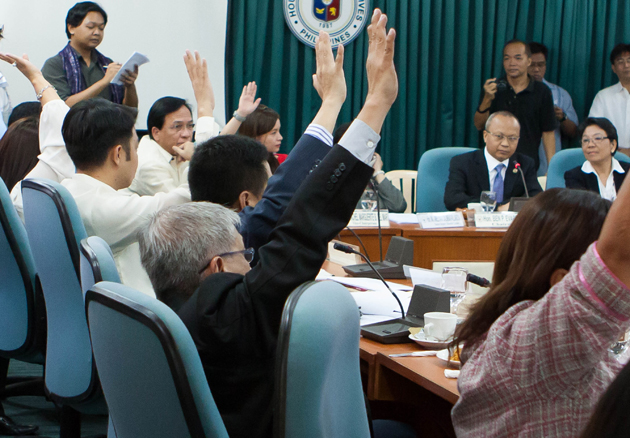AFTER CONSTANT missteps and numerous delays, the proponents of the Freedom of Information (FOI) bill found reason to celebrate as the measure finally hurdled past the committee level of the House of Representatives last November 27.
Although several amendments were proposed during the hearing, the House committee on public information put the consolidated version of the bill into a vote, with a count of 17 in favor, three against and one abstention.
The vote marked another milestone in the 21-month-old crusade, with the House version of the bill entering the plenary session. The Senate version of the bill is already in the plenary.
Quezon Rep. Lorenzo “Erin” Tañada, one of the co-authors of the FOI bill, greeted the victory with controlled optimism.
“Total victory is when FOI is passed into law. Malayo pa tayo (We are still far from it),” said Tañada.
Last December 11, the Senate passed the bill on second reading. Sen. Gregorio Honasan, its main sponsor, promised its passage on the third and final reading.
Need for progress
Freedom of information has been seen as a gaping hole in the country’s democracy for more than a decade, but the contentious views of several groups have been stalling progress in this regard.
“In the 14th Congress, the bill was already ripe for approval into a law, but it was killed at the final legislative step at the House of Representatives,” said Nepomuceno Malaluan, coordinator of the Institution for Freedom of Information (I-FOI).
Early on, both Malaluan and Tañada expressed optimism about the bill’s chances in the 15th Congress, with President Benigno Aquino III’s strong advocacy against corruption in light of his thrust of matuwid na madaan (straight path). They said, however, that there have been roadblocks and wavering support on the part of Aquino.
Malaluan recalled how Aquino, as he began his term, organized a study group to delve into the clauses of the bill which touched on national security and executive privilege.
“[I-FOI] agreed to [the reductions of] the penalties for violation of the right to information, reclassifying most acts from criminal to administrative offenses,” said Malaluan, only to find Malacañang eventually withdrawing attention from the bill.
In addition, Tañada was also concerned about Aquino not certifying the bill as urgent or coming out strongly in support of the bill. Despite the lack of cooperation from Aquino, though, Tañada noted, “We are three independent branches of government… It is supposed to be the congressmen or the senators who should come up front and ensure that this piece of legislature be enacted to law.”
Dilly-dallying
The House members’ constant failure to meet quorum also pushed the bill further behind schedule. Last October 9, committee on public information Chairman Rep. Ben Evardone suspended a hearing on the bill due to the lack of an available room in Batasan.
During the postponed hearing on November 13, pedantries and technicalities prevented a vote. A bill regarding the Filipino sign language and another one declaring November 23 as Press Freedom Day were tackled before the FOI was raised to the floor. Even then, Nueva Ecija Rep. Rodolfo Antonino spent most of the remaining time pressing for the insertion of his Right of Reply bill (ROR).
The ROR mandates news agencies that utilize information gathered through provisions of the FOI to concurrently print or air the side of the entities affected by their publication, may these be private corporations or public officials. “We want a minimum semblance of guarantee from the media [that they will allow politicians a rebuttal],” said Rep. Rodante Marcoleta.
The ROR was discussed again during Tuesday’s session, with Antonino and Rep. Amelita Villarosa sharing personal anecdotes of irresponsible media practices to some congressmen.
“If they do not publish the other side of the story, isn’t that also censorship?” said Antonino. He said that the ROR simply advocates “responsible journalism and protects the rights of private individuals and public officials,” referring to what he called the “unaccredited media” who sell the angle of their pieces to the highest bidder, regardless of possible consequences.
The arguments for ROR were later refuted by Rep. Teodoro “Teddy” Casiño, who argued that libel and defamation laws are already in place.
“There are enough safeguards within the media. To come up with a policy to regulate editorial policies is also dangerous,” said Ifugao Rep. Teddy Baguilat, also in repudiation of the ROR.
However, as amendments can also be put forward during the plenary session, several congressmen showed impatience towards Antonino’s arguments. This led to a call for the much awaited vote without the ROR.
Democratic ideals
The FOI is said to be the legislature’s collective push towards achieving a more democratic government. “Having effective access to government information will empower the citizens to effectively participate in government decision-making, contribute in monitoring the use of government funds and enable them to avail of government programs,” explained Malaluan.
The foundational goals of freedom of information are inherently constitutional and found within the rubrics of the Bill of Rights. However, Malaluan opined that “the Bill of Rights provision, while it is legally enforceable, is lacking in substantive and procedural details necessary for its effective implementation.”
The FOI bill is said to refine this provision by setting down the definite scope and procedure of access to information. For the bill’s proponents, it effectively closes loopholes that otherwise allow government officials to abuse the resources at their disposal.




